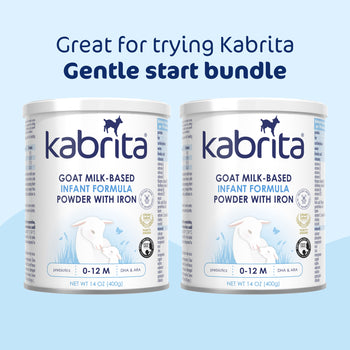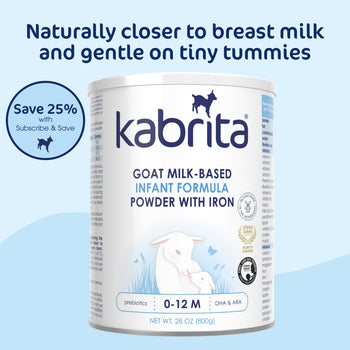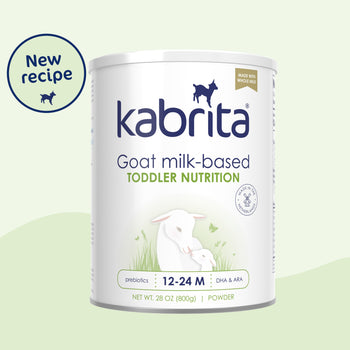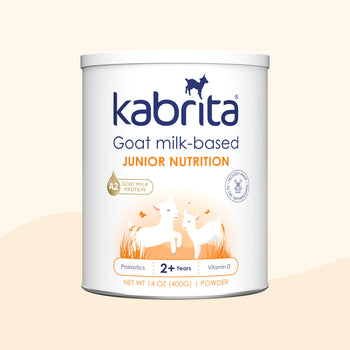Goat Milk Formula Benefits for Toddlers: Why It’s a Smart Choice
By Jessica D'Argenio Waller, MS, CNS, LDN
As parents and caregivers, you want to give your growing toddler the very best nutrition to support their healthy development. Your busy little one (12 months and older) may be ready to graduate from infant formula and is already incorporating more solid foods at mealtimes, but because nutrition is so fundamental during this stage of rapid growth, a fortified toddler formula—and goat milk toddler formula specifically—may be a smart way to fill in any nutrient gaps. Picky eating can also pop up after the 12 month mark, and using a toddler formula ensures your little one is getting what they need during this period of foundational brain development, while taking some of the pressure and guesswork off of you. Here's what to know about the difference between infant and toddler formula, goat milk benefits for toddlers, and why choosing toddler formula vs. whole cows milk could be the right choice for your family.
Table of contents
What is toddler formula?
Do toddlers need formula?
Benefits of goat milk formula for toddlers
FAQs on toddler goat milk formula
First things first: What is toddler formula?
Toddler formula is a formula designed specifically for toddlers between the ages of 12 and 36 months. Up until this point, your baby likely received breastmilk, infant formula, or a combination— in addition to starting solid foods around the 6-month mark. As your growing baby reaches new milestones, their nutrient needs increase. Though many toddlers get what they need from solid foods and the addition of a milk (such as cow's milk or the continuation of breastmilk), a goat milk-based toddler formula can be a helpful option for those who may be sensitive to cow's milk or who have already weaned from breastmilk. Toddler formulas are tailored to provide age-appropriate levels of vitamins, minerals and macronutrients for your now not-so-tiny tot.
Understanding the role of toddler formula
Curious about the difference between infant and toddler formula? Toddler formula can be offered to your little one in between mealtimes and is meant to serve as supplemental nutrition— but it's not a meal replacement. While it shares some similarities to infant formula, toddler formula differs in a few key ways.
-
Higher calorie density: Toddler formulas typically contain more calories per serving than infant formulas to support rapid growth and development.
-
Additional nutrients: Toddler drinks are formulated to contain higher levels of vitamins and minerals, like iron and phosphorus, that toddlers need for their age and developmental stage.
-
A complement to solids: Unlike infant formula, which is considered a complete source of nutrition for your baby, toddler formula is designed to complement the solid foods your little love is already eating. Beyond 12 months, infant formula is not meant to be your toddler's primary or only source of nutrition.
Do toddlers need formula?
It's important to note that toddler formulas may not be necessary for every child. The American Academy of Pediatrics (AAP) recommends transitioning from infant formula to cow milk starting at 1 year of age, says Ari Brown, MD, FAAP. "Both cow milk and goat milk can provide an important source of fat, protein, and calcium for growing toddlers," she explains.
There may be other cases in which a toddler formula is preferable. “A fortified nutritional drink like toddler formula may be specifically recommended in cases where a child has a growth issue, history of prematurity, sensory or oral motor delay or severe feeding aversion,” says Dr. Brown. Dietary restrictions, allergies or food sensitivities may also limit a toddler's intake of certain nutrients, and a supplemental drink like toddler formula could help cover the gaps. If you're concerned about your toddler's nutrition, be sure to talk to your child's pediatrician.
Benefits of goat milk-based formula for toddlers
-
Easy to digest: Goat milk naturally forms softer, looser curds in the stomach compared to cow's milk,1 making it gentle on little tummies and easier for your toddler to digest, Dr. Brown says. The whey proteins in goat milk have been shown to break down more quickly than those in cow's milk,2 which can mean less digestive discomfort for your little one.
-
Better tolerated: Kabrita's European goat milk toddler formula has a modified whey-to-casein protein ratio that makes it more similar in composition to breastmilk, which can make it better tolerated than cow's milk for some children.3
-
Natural prebiotics: As compared to cow's milk, goat milk is 5 times higher in oligosaccharides4, a complex carbohydrate that acts as prebiotic fibers, which support the gut microbiome's development and protect against harmful bacteria and pathogens.5
-
Nutrient-rich profile: Goat milk is packed with essential vitamins and minerals your growing toddler needs, including vitamin D for strong bones7, folic acid for healthy growth,8 and iron for brain development.9 Plus, Kabrita's goat milk toddler formula contains DHA and ARA fatty acids to help support your toddler's brain and eye development.10
FAQs on toddler goat milk formula
Is goat milk formula good for toddlers?
Because it is easy to digest and contains vitamins, minerals and other nutrients helpful for healthy growth, goat milk formula can be beneficial for toddlers. Goat milk toddler formula can be an especially nutrient-rich choice in the following situations:
-
Toddlers transitioning from infant formula (both goat-milk based or cow-milk based)
-
Picky eaters looking for consistent nutrition
-
Children who may be sensitive to cow milk proteins
If you're considering goat milk formula for your toddler, look for options made without unnecessary additives like corn syrup or maltodextrin, and ensure formula companies are prioritizing safety and quality by following good manufacturing processes (GMP). If you have more questions about whether goat milk formula is good for toddlers, it's a smart idea to talk with your pediatrician about whether it might be the right choice for your little one.
What are the advantages of goat milk formula?
In addition to being easy to digest, here are a few other advantages of goat milk formula:
-
Nutrient-rich profile: Goat milk formula provides essential nutrients including vitamin D, folic acid, iron, and brain-supporting fatty acids DHA and ARA.
-
Natural prebiotics: Goat milk contains 5 times more beneficial oligosaccharides than cow's milk,4 which help support your child's developing immune system.5
What age can babies have goat milk-based infant formula?
Infants can start using a goat milk-based infant formula on day one. The AAP considers goat milk-based infant formula an appropriate first-line option for baby's first year, as it's nutritionally complete. Goat milk-based infant formula can be used between ages 0 to 12 months.
At what age can babies have toddler goat milk-based formula vs infant goat milk formula?
Toddler goat milk formula is specifically designed for children over 12 months of age. Before this milestone, babies should be fed breastmilk or infant formula (or a combination), which are better suited to meet the nutritional needs of babies under one year. Experts do not recommend giving toddler formula to infants under 12 months, as it hasn't been assessed to provide the precise nutrition they need during their critical first year of development.
What are the side effects of goat milk formula for toddlers?
In general, most toddlers transition to goat milk formula without any issues, especially if they were previously using a goat milk infant formula. However, as with any dietary change, some toddlers might experience mild digestive adjustments at first. You might notice a slightly different stool consistency or minor shifts in feeding patterns, but these small changes typically resolve as they adapt to the new formula. But it's worth reiterating: If your toddler has a diagnosed cow's milk protein allergy, they should not use goat milk formula as an alternative, as the proteins in goat milk are similar enough to those found in cow's milk. Be sure to consult with your pediatrician about the best options for your child.
Is goat milk good for a toddler?
After the first year of life, pasteurized goat milk can be a good source of fat, protein, and calcium for growing toddlers, similar to cow milk, says Dr. Brown. Some families may opt for a goat milk toddler formula, a supplemental drink which is fortified with additional nutrients such as iron and zinc. But it's vital to note that for infants under 1 year of age, pasteurized goat milk is unsafe, warns AAP, as pasteurized goat milk does not contain the just-right balance of macronutrients necessary to support infant growth and development. Instead, opt for a goat milk infant formula, a safe alternative for babies which has been modified to feature the right balance of nutrients.
What are the side effects of goat milk for toddlers?
Goat milk is a mild and creamy drink similar to cow milk. Most toddlers transitioning away from infant formula can start drinking goat milk after they turn 1 year of age, and there usually aren't any issues with the switch. Most toddlers adapt well to goat milk, and many parents report that their little ones seem to digest it more easily than cow milk. As with any dietary change, the key is to introduce it gradually and watch how your toddler responds.
Does goat milk help babies gain weight?
Pasteurized goat milk alone is not a safe choice for babies under 1 year of age, although it's a good source of fat, calories and protein, it may not contain sufficient nutrients to support your baby's development during this critical growth stage. Goat milk infant formula, in contrast, is recommended by the AAP as a first-line option for baby's first year of life, as it promotes healthy growth and development for infants, along with breastmilk, soy or cow's milk infant formula. One study shows that babies consuming goat milk infant formula had similar weight gain to babies consuming cow milk infant formula. If you're concerned about your baby not gaining weight, your pediatrician should be able to recommend the best next steps.
Toddler formula vs whole milk: which is better?
The choice between toddler formula and whole milk from a cow will depend on your child's specific needs, eating habits, and overall diet. Some families use a combination of both, especially as toddler formula is fortified with extra vitamins and minerals that support growing kids, including iron and vitamin D. Toddler formula may offer parents of picky eaters some relief, as it also provides consistent nutrients in every serving, though most toddlers (even picky ones!) are still able to meet their daily nutrient needs from solid foods and whole cow's milk. Goat milk's unique protein ratios are easier to digest compared to cow's milk, making goat milk toddler formula a gentle stepping stone from breast milk or infant formula. Ultimately, your pediatrician can help you decide what's best for your little one based on their individual growth and nutritional needs.
Bridging the gap
For parents and caregivers looking to bridge the gap between infant and "big kid" nutrition, toddler formula can be a valuable tool in supporting your little one's continued growth and development. If you're considering goat milk formula for your toddler, talk with your pediatrician about whether it might be the right choice for your little one's unique needs. Ready to learn more? Explore the full range of Kabrita goat milk formulas and discover why families worldwide choose this gentle, nutrient-rich option.
Sources
-
Park YW, Haenlein GFW. Handbook of milk of non-bovine mammals. 2nd ed. 2017, Ames, Iowa: Blackwell Pub.
-
Ye A, et al. Coagulation behaviour of milk under gastric digestion: Effect of pasteurization and ultra-high temperature treatment. Food Chem. 2019;286:216-225.
-
Maathuis A, Havenaar R, He T, Bellmann S. Protein Digestion and Quality of Goat and Cow Milk Infant Formula and Human Milk Under Simulated Infant Conditions. J Pediatr Gastroenterol Nutr. 2017;65(6):661-666. doi:10.1097/MPG.0000000000001740
-
van Leeuwen SS, et al. Goat milk oligosaccharides: their diversity, quantity, and functional properties in comparison to human milk oligosaccharides. J Agric Food Chem. 2020;68(47):13469-13485.
-
Oliveira DL, et al. In vitro evaluation of the fermentation properties and potential prebiotic activity of caprine cheese whey oligosaccharides in batch culture systems. Biofactors. 2012;38(6):440-449.
-
Zuurveld M, et al. Immunomodulation by human milk oligosaccharides: the potential role in prevention of allergic diseases. Front Immunol. 2020;11:801.
-
Bendik I, et al. Vitamin D: a critical and essential micronutrient for human health. Front Physiol. 2014;5:248.
-
Strand TA, Taneja S, Kumar T, et al. Vitamin B-12, folic acid, and growth in 6- to 30-month-old children: a randomized controlled trial. Pediatrics. 2015;135(4):e918-e926. doi:10.1542/peds.2014-1848
-
Domellöf M. Iron requirements in infancy. Ann Nutr Metab. 2011;59(1):59-63.
-
Agostoni C. Role of long-chain polyunsaturated fatty acids in the first year of life. J Pediatr Gastroenterol Nutr. 2008;47 Suppl 2:S41-S44.



